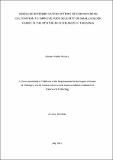| dc.description.abstract | Complementarities of common bean (Phaseolus vulgaris L.) with non-legume food crops and
their significances to the agricultural systems are underexploited. Based on the description of
this study, eight options were assessed for the sustainable intensification of common bean
cultivation (through manipulations of intercropping and rotation) against the monocultures of
maize (Zea mays L.), and the improved and local varieties of common bean in the northern
highlands of Tanzania. The factors assessed were the cropping seasons/years (S) (2015 to
2017), agro-ecological zones (A) above sea level (lower 843 m, middle 1051 m, upper 1743
m), cropping systems (C) (sole, intercrop, rotation), and bean varieties (V) (improved
Lyamungu 90 and local Mkanamna) and their interactions. Results indicated that S, A, C, and
S×A, S×C, S×A×C were significant and bean grain yields increased in intercrops ranging
from 1.5 to 2.9 t ha-1 with land equivalent ratio (LER) of 1.58. Intercropping over five
cropping seasons indicated that with S×V grain yields increased from 0.2 to 3.5 t ha-1
in bean
and from 2.3 to 2.6 t ha-1
in maize with LERs of 1.48 and 1.55. In rotations, higher bean grain
yields were attributed to S (3.3 t ha-1
), C (3.4 t ha-1
), and V (2.7 t ha-1
) and for maize were in C
(2.9 t ha-1
) and S (2.6 t ha-1
). In conclusion, out of eight assessed options, this study found two
main useful options for improving food security on smallholder farms in the northern
highlands of Tanzania. The options were continuous cultivation of the improved and/or local
varieties of common bean in intercrops with the maize throughout two rainy seasons of the
year (long and short). Another option was cultivation of the improved and/or local varieties of
common bean intercropped with maize in the long rainy season and rotating of these
intercrops with the maize cultivated in the short rainy seasons. Importantly, the improved
bean variety Lyamungu 90 was heavier in weight, using the same number of seeds, than the
local bean variety Mkanamna, which provided additional factors to be considered to improve
income where weight is the acceptable standard in the market. | en_US |

